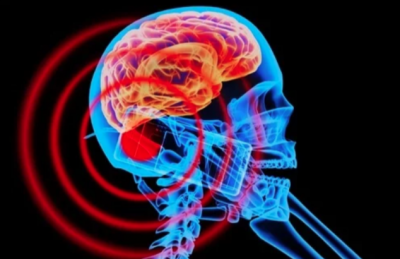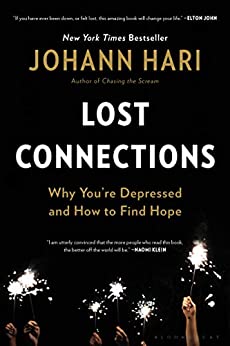Uncovering the Real Causes of Depression. The Antidote: “Reconnection”
A book review of Johann Hari’s work "Lost Connections: Uncovering the Real Causes of Depression—and the Unexpected Solutions".

We bring to the attention of our readers, this timely and incisive article by Radhika Tikku, Ph.D candidate at Queen’s University, Kingston, Ontario.
millions of people Worldwide are suffering from depression as a result of the global crisis which is affecting humanity.
The pandemic is based on fear. it’s a big lie.
People are being manipulated. They have accepted the consensus imposed upon them: economic collapse, social engineering, poverty, despair and depression.
The impact of this crisis on mental health is beyond description. The Anti-dote is “Reconnection”: Solidarity and Mass Social Action against this diabolical project.
Michel Chossudovsky, Global Research, July 21, 2020
***
Depression is a global problem that’s on the rise.
In Lost Connections, Johann Hari offers practical solutions for how to tackle it. Unfortunately, he misses the crucial point that personal sacrifice is the only way we can discover what makes us content.
Hari explores the sources behind depression and anxiety.
Knowing depression, Hari considers two main explanations for why depression occurs. Each blames the individual. One is that depression is the result of overactive imagination, or weakness of the will. The other is that depression is caused by brain malfunction. The brain’s chemistry is “off” and needs to regain equilibrium.
Hari scrutinizes both explanations. For the first, the sheer numbers suggest depression is not the effect of false consciousness, or that depressives lack fortitude. The second is not supported by science. So, Hari offers an alternative explanation.
Depression requires us to revise the way we live in the world. In fact, we should ask: What does it mean to be human?
Depression “is a normal response to abnormal life experiences”. [1] It’s like grief. Grief is human suffering that stems from loss. Grief is relational. We grieve the death of a loved one because we stand in a bi-directional relationship with them.
Death is not an abnormal life experience; however, modern culture has made it so.
We intellectually know that death occurs, but we do not live as if we ourselves will die.
We live out of joint with the world, as if we’re invincible. Thus, Hari’s alternative explanation is that depression is a social problem. Depression is the illness we contract when disconnected from sources of meaning. The disconnection is disorienting because we lose a part of ourselves. The antidote: Reconnection.
Hari offers sources from which we might draw meaning. All involve the individual changing life in substantive ways and becoming part of a community, closer to the soil. Our ancestors understood this fact better than we today.
Hari is skirting around the problem of the ego. It has practical, political consequences. Hari looks at ways to overcome depression, but he could have gone further: We have to change our relationship with ourselves. We need to talk about identity and how it negatively impacts us.
For instance, we’re not the “author” of our own stories. That slogan is false, because it doesn’t account for the way the world actually is. It cloisters us from the very freedom and choice we so desperately desire. Identity functions like a map; it aids in the navigation of familiar and uncharted territory.
But there’s no use clinging to a moth-eaten map, where a portion of the legend and other key elements are missing. Ancient scholars understood that a person’s identity can be self-imprisoning, which is why they advocated for the renunciation of the self. Thinking yourself the hero of your life—just like thinking yourself the victim of all that’s happened to you—can obscure real knowledge about yourself.
 Hari doesn’t go that far. He should have touched on renunciation of the self and how to go about it.
Hari doesn’t go that far. He should have touched on renunciation of the self and how to go about it.
Renunciation of self has three dimensions. First, it requires a relentless on-going engagement between self and the world. This includes ideas. Maps are always subject to revision or wholesale rejection given new conventions or interests.
For example, Hari’s case of the reconstitution of Kotti, the tenement housing in Berlin, leaves this out. When people create a neighbourhood to force recognition of prohibitive rental increases, Kotti’s struggle was not over when the German government made concessions. But living in community, if it is really about connection, is constant negotiation toward rejuvenation of the group and ideas presupposed in one’s identity as a group. Otherwise, old ideas remain in place, obstructing real constructive change.
There has to be a constant forsaking if the objective is really to discover what it means to be human because we live in a dehumanizing world, the full nature of which is not always evident.
It’s a risky prospect.
Second, renunciation involves personal sacrifice. You have to actually give something of value up to discover new ways of living and being in the world. Sacrifice is not valued, culturally. The global pandemic forces us to do without that which we believed to be essential. New social conditions compel us to decide what is essential and give up the rest.
Third, this matters to truth. Just because map-makers reconfigure maps in light of new conventions and interests doesn’t mean anything goes. Maps are accurate or they are not; they either aid in the wayfinding experience, or they don’t. Similarly, personal sacrifice can lead us to living life more truthfully, thriving instead of merely existing.
Hari’s conclusion about a return to community and to nature to heal ourselves, to become self-possessed in ways that were previously impossible, shouldn’t be surprising but it is. It has consequences that challenge other beliefs, some cherished.
There’s more to be said though because we have to confront ourselves to get past ourselves. The ancients understood this point on a much deeper level than us.
*
Note to readers: please click the share buttons above or below. Forward this article to your email lists. Crosspost on your blog site, internet forums. etc.
Radhika Tikku is a PhD candidate at Queen’s University, Canada and is currently living in Hong Kong. Her areas of interest are social epistemology and moral philosophy.
Note
[1] Hari, Johann. 2018. Lost Connections: Uncovering the Real Causes of Depression—and the Unexpected Solutions. New York: Bloomsbury USA. 112.

